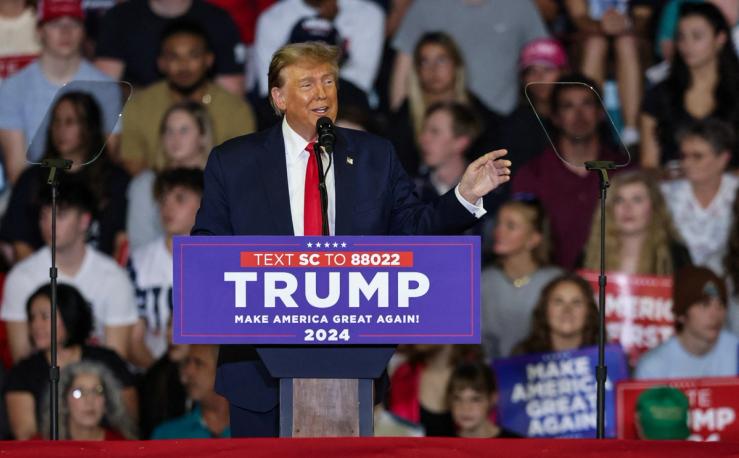The News
Republicans defended former President Donald Trump on Sunday over remarks he made about encouraging Russia to attack countries that do not meet NATO’s defense spending goals, saying they weren’t concerned and that his words shouldn’t be taken literally.
“I think he’s trying to make a point. I’m not worried about it at all,” Sen. Lindsey Graham, R-S.C. told reporters at the U.S. Capitol. He said starting a war would be the “last thing” Russia would do if Trump were president.
Speaking on CNN, Sen. Marco Rubio, R-Fla., who last year sponsored a law that prevented any U.S. president from unilaterally withdrawing from NATO without consent of the Senate, said he had “zero” concerns about Trump’s comments and argued they were being misinterpreted.
“Donald Trump is not a member of the Council on Foreign Relations,” Rubio said. “He doesn’t talk like a traditional politician, and we’ve already been through this. You would think people would’ve figured it out by now.”
At a rally in South Carolina on Saturday night, Trump recalled his efforts to pressure NATO countries to increase their defense spending during his first term.
“One of the presidents of a big country stood up and said, ‘Well sir if we don’t pay and we’re attacked by Russia, will you protect us?’ I said, ‘You didn’t pay, you’re delinquent?’ He said, ‘Yes, let’s say that happened,’” Trump told the crowd. “No, I would not protect you. In fact, I would encourage them to do whatever the hell they want. You’ve got to pay. You’ve got to pay your bills. And the money came flowing in.”
The White House quickly responded, calling the comments “appalling and unhinged” and dangerous to U.S. national security.
In this article:
Know More
Sen. Thom Tillis, R-N.C. was more critical of Trump than his colleagues but also suggested the former president’s comments shouldn’t be taken literally.
“Obviously, that is not something I believe that he should have said but also I don’t believe it’s something that he honestly believes,” Tillis told reporters. “If he understands the Article 5 commitment of NATO, any attack on a NATO ally would have devastating consequences for American men and women who would be deployed to defend them.”
Sen. Mike Rounds, R-S.D., meanwhile, said he would pay more attention to Trump’s actions rather than his words.
“None of us want to see a war in Europe and I don’t think he does either,” Rounds told reporters. “And very clearly we’re going to defend our NATO allies and I’m quite certain the president does not want to see us in a war with Russia.”
Step Back
NATO guidelines encourage members to spend 2% of their GDP on defense, a mark many countries in the alliance have historically had trouble hitting. Trump regularly called on allies to spend more on defense during his presidency, suggesting inaccurately that they owed the U.S. a “tremendous amount of money.” Several countries ramped up military expenditures in response. Article 5 of NATO’s treaty says that an armed attack on one member is considered an attack on all of them.
The View From Europe
Some European officials pushed back on the comments without invoking Trump directly.
“Any attack on NATO will be met with a united and forceful response,” NATO Secretary General Jens Stoltenberg said in a statement. “Any suggestion that allies will not defend each other undermines all of our security, including that of the U.S., and puts American and European soldiers at increased risk.”
European Council President Charles Michel posted on X: “Reckless statements on #NATO’s security and Art 5 solidarity serve only Putin’s interest.”
Tomáš Pojar, national security adviser of the Czech Republic, told Semafor that he agrees with Trump that NATO members need to meet their 2% spending goal but hoped Trump would assure allies that do meet the target that the U.S. will stand with them.
“Those who do not want to spend it in fact give a clear signal that they are also not willing to defend themselves if under attack. And if you do not want to defend yourself it is hard to imagine and expect that someone is going to come for a rescue,” Pojar said.
He also said he had no reason to doubt the U.S. commitment to the alliance. “If we have not believed in U.S. commitments to NATO, we would not be spending billions for F35s, helicopters and other U.S.-made weapons systems,” Pojar said.


